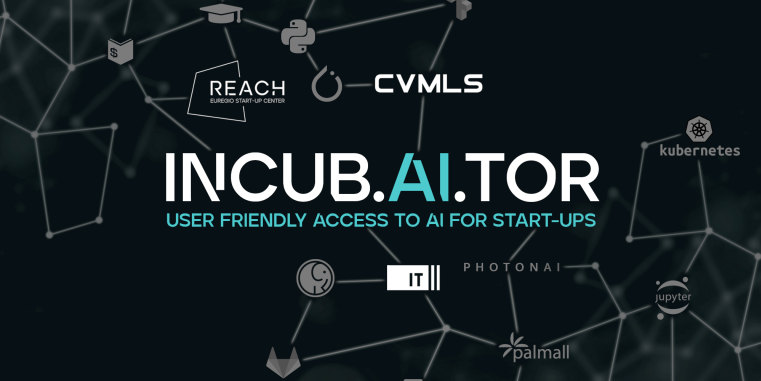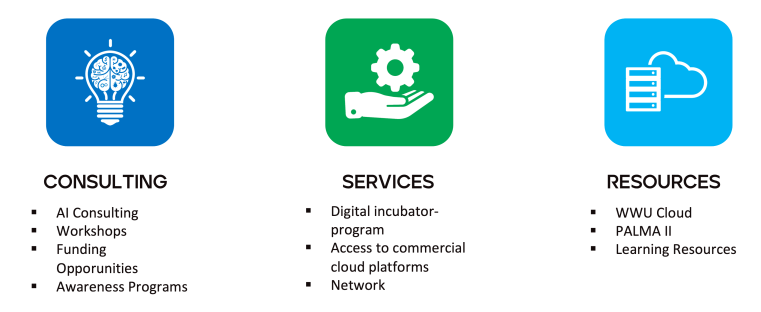

AI for Start-ups
The REACH Euregio Startup Center provides AI-based start-up ideas with easy access to the scientific and technical resources of WWU Münster through its Incub.AI.tor platform. In addition, possible AI-based business models such as software-as-a-service are explained and the provision of API's is introduced, as well as the use of commercial cloud providers.
Tutorials, walkthroughs and interfaces will be developed to enable start-ups to use the High Performance Cluster (Palma II) as well as the WWU Cloud and OpenStack. REACH will also facilitate access and transition to commercial cloud providers. Thus, the Inub.AI.tor can act as a support platform for aspiring founders from all areas of science.

Coaching and Scouting
In our coaching sessions, we advise you on your start-up projects on topics such as financial support, building prototypes or MVPs. Scouting represents the interface between science and entrepreneurship, through which scientific projects can be evaluated and promoted from within the university. In combination with the existing (pre-)incubator programs, we offer a great expertise from business and science to young entrepreneurs.
The REACH for EXIST program is aimed in particular at applications for various funding formats in the field of start-ups from science.
With view to AI start-ups, we have developed the incub.AI.tor program, in which we develop your start-up idea together with the expertise of AI scientists.
If you are interested, apply directly to the linked programs or contact us: reach-scouting@wiwi.uni-muenster.de
Services
The pre-incubator and incubator offerings address all scientific start-up ideas. Founding teams in these programs can also access special programs and perks from commercial startup providers.
The pre-Incubator program is the first step in your start-up journey. The online academy offers you valuable methods and recommendations to get your start-up on the right track. In addition to coaching sessions, interactive workshops and networking events, you will also gain access to the start-up community.
The structured incubator program aims to build the foundation for your start-up and get you on the road. In 6 months, weekly coaching sessions, first-class workshops, strong support from mentors and buddies, as well as a digital academy for all topics related to your start-up will provide you with the tools and knowledge you need to start on the path towards your first product and paying customers. We support you according to your needs, whether it's business model development, networking or financing.
Tutorials and Infrastructure
The course's low-threshold tutorials cover the following topics:
- Training models using PhotonAI
PhotonAI is a high-level Python API that can be used to quickly and easily create machine learning pipelines. It is based on well-known frameworks such as Scikit-learn and Keras.
- Training with TensorFlow
TensorFlow is a framework that enables the processing of multidimensional data and the training of deep neural networks in particular. Interfaces to numerous programming languages are offered so that the trained models can also be used on mobile devices, for example.
- Training on PALMA II at WWU
WWU's high-performance computing cluster offers many resources. Here you will learn how to train your model there.
Code management and deployment
- Code management with GitLab
A good code management is essential in software projects to make changes traceable and if necessary undo them. We will introduce the basics of the code management system GitLab, which is also operated by the WWU. Through automated deployment using GitLab, the software can be deployed to the WWUKube in an automated way. For this, we consider CI/CD pipelines and show how the automation of builds works.
- Creating an API with Flask
Flask is an extremely streamlined web framework that comes with its own web server for development. The sparse defaults on the part of Flask leave a lot of room for your own custom solutions.
- Deployment with Docker
We would like to allow our program to run reliably on a (nearly) arbitrary server independent of other applications. Container virtualization software, such as Docker, is a good choice for this.
- Deployment to the WWUKube
The WWUKube is the multi-tenant Kubernetes cluster at WWU on which services can be made available. By tightly integrating with WWU's CEPHFS storage system, data can be easily shared between PALMA, JupyterHub, OpenStack, and WWUKube.
- Deployment to commercial cloud providers
tbd.


